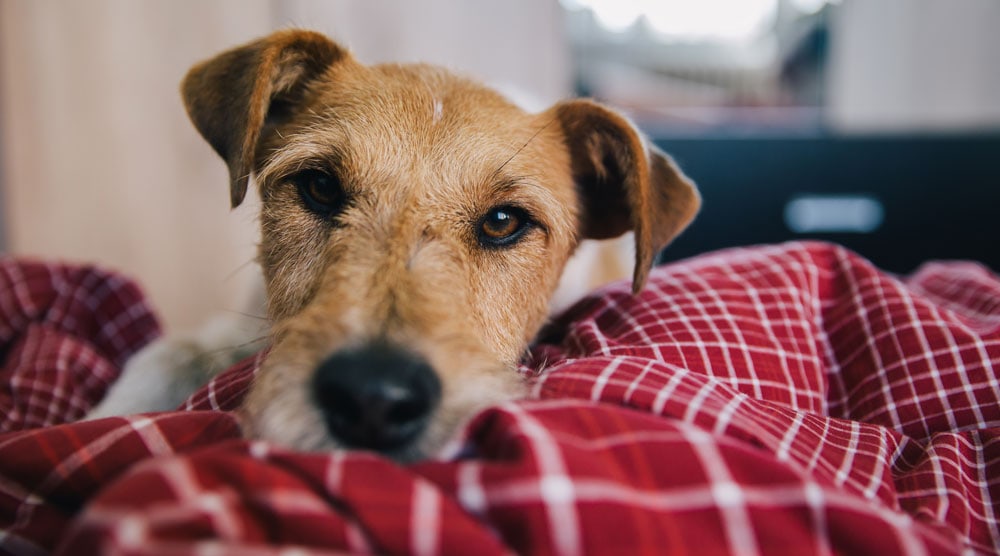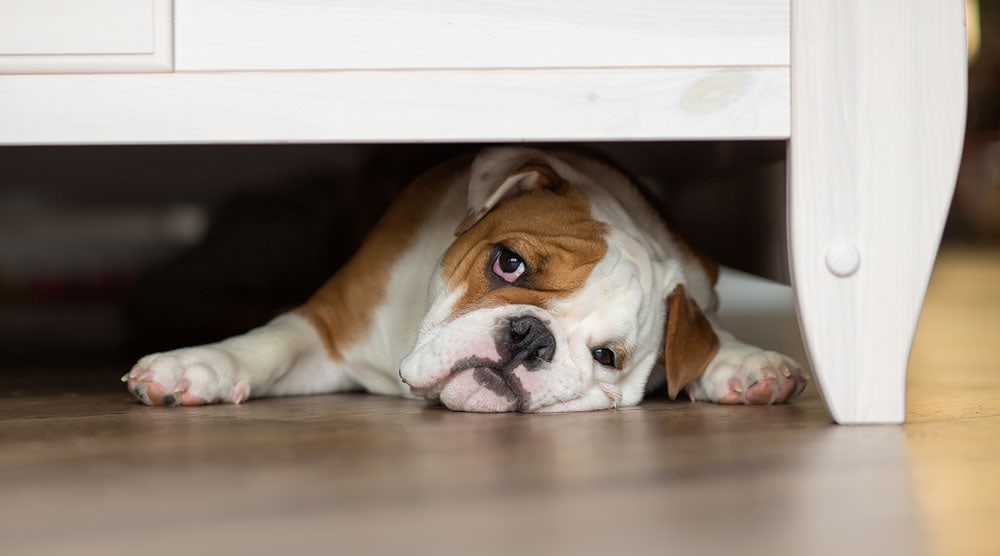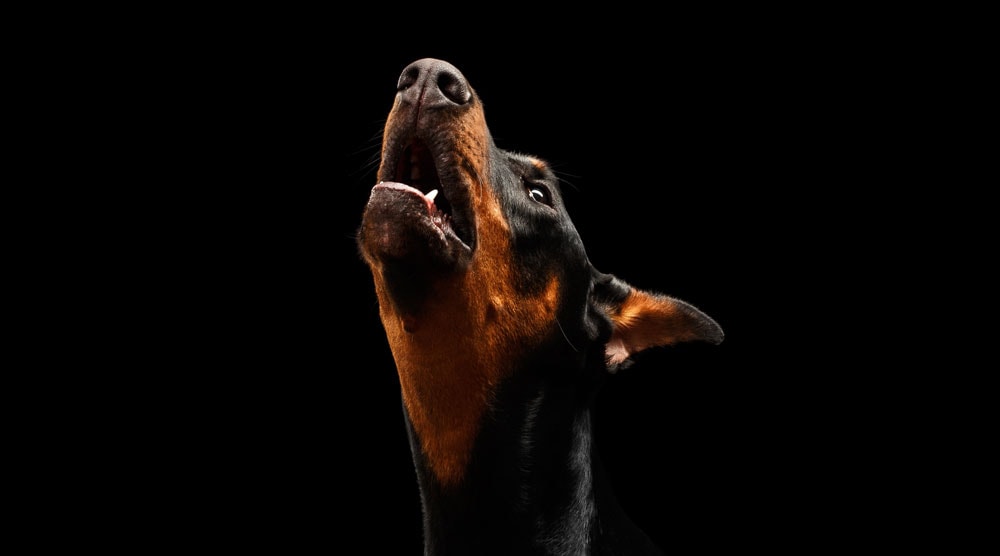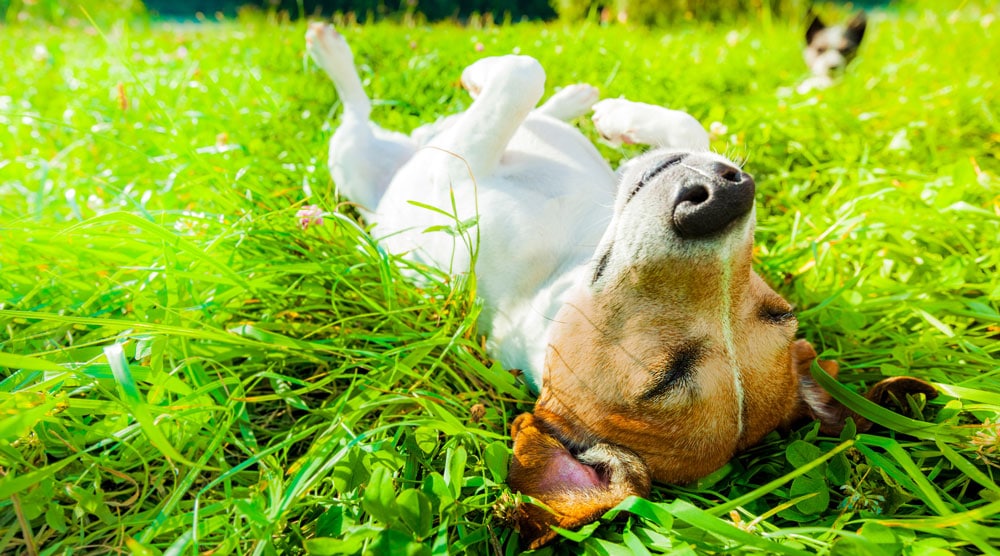Does your dog regularly wake up? Here are some of the most common reasons for a dog waking up in the middle of night, along with tips for improving your pet’s sleep.
Contents
- Before We Begin…
- 15 Possible Reasons Why Your Dog Wakes Up at Night
- 1. Needing the Toilet
- 2. Loud or Unfamiliar Noises
- 3. Lack of Mental Stimulation
- 4. Lack of Physical Exercise
- 5. Discomfort Due to a Medical Condition
- 6. Hunger or Thirst
- 7. Separation Anxiety
- 8. Nightmares
- 9. Waking Up Has Become a Positive Experience
- 10. Discomfort Due to Bedding
- 11. A Change in Routine
- 12. Too Hot or Cold
- 13. Sleep Apnea
- 14. Overstimulation Before Bed
- 15. Canine Cognitive Dysfunction Syndrome in Senior Dogs
- How to Stop a Dog from Waking Up at Night
- Should Your Dog Sleep in Your Bed?
- Frequently Asked Questions
- Summary
In this article, we’ll go through 15 of the most common reasons for a dog waking up in the middle of the night. We’ll also discuss tips and strategies for helping your dog to sleep.
Before We Begin…
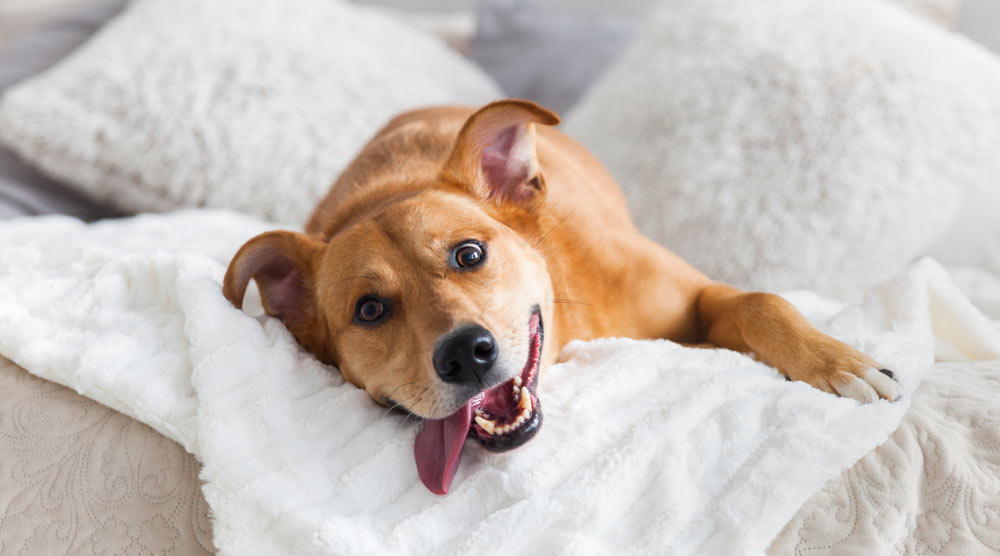
Waking Up is Not a Sign of Dominance
Dogs don’t wake up at night to become “pack leader” or frustrate you – there is always an underlying reason.
The idea that dogs want to be dominant is a misunderstanding that’s been debunked many times. Even wolves, which were the animals used to develop dominance theory, have been shown not to have alpha males and alpha females.
The science of dog behaviour is beyond the scope of this article, but the truth is dogs aren’t concerned with ruling the household. Instead, they behave based on their current emotions and physical feelings.
So, if your dog is waking up at night, this behaviour is likely due to anxiety, stress, excitement, or pain.
The key to solving the issue is finding the underlying cause and taking steps to reduce or prevent it. Never punish your dog for waking up, as this will damage your bond, cause additional stress, and make it harder for your dog to sleep in the future.
It’s Normal for Puppies to Not Sleep Through the Night
Puppies have small bladders and naturally avoid soiling where they sleep. Most puppies also miss sleeping with their mother and littermates and feel anxious about being in a new environment.
For these reasons, it’s unreasonable to expect a young puppy not to wake up multiple times each night. Of course, some puppies adapt faster than others, but nearly all whine, bark, or howl during the first nights in a new home.
You should plan to get up throughout the night to take your puppy to the toilet – especially during the first few weeks. Creating a routine helps your new puppy relax faster while speeding up toilet training.
Always Get a Vet Checkup If You Notice Sudden Behaviour Changes
Behaviour changes, including waking up at night, can signal a medical condition.
Dogs may wake up due to various illnesses, ranging from urinary tract infections to canine dementia. So, if you notice your dog is waking up more and there’s no apparent cause, then a vet checkup is essential.
15 Possible Reasons Why Your Dog Wakes Up at Night
1. Needing the Toilet
One of the most common reasons for a dog waking up at night is that they need the toilet.
Puppies or elderly dogs often struggle to last through the night without going for a wee. Adult dogs may also have this issue, although, for toilet-trained dogs, this could be a sign of a medical problem.
One way to prevent your dog from waking up during the night is to make sure they go to the toilet before going to bed. This won’t always solve the problem, but can make it less likely that your dog needs to go out.
Consistently getting up at the same time in the morning may also help, as the dog will learn when he’s next going to be allowed outside.
Tip: If a previously housetrained adult dog has developed toileting issues, then you should always contact a vet for a checkup.
2. Loud or Unfamiliar Noises
Dogs have excellent hearing. Aside from having more sensitive ears than us, they can also hear noises up to frequencies of 45,000Hz, which is more than double a human’s range.
The downside of such sensitive hearing is that dogs are easily disturbed by unfamiliar noises at night. All noises seem louder and scarier to a dog, and they may be woken by noises you cannot hear.
A potential solution is to play white noise to cover up noises. Consistent background noise can be calming for dogs while preventing them from hearing noises that might wake them up.
If you realise there’s a specific noise that’s disturbing your dog, then you may need to implement a gradual desensitisation program. A dog behaviourist will be able to help you with this.
Tip: You can find free white noise generators on both Android and iOS. We’ve found that brown noise or the hum of an air conditioner work well, but you can experiment to see which your dog finds most relaxing.
3. Lack of Mental Stimulation
Dogs need mental stimulation throughout the day to tire them out. If your dog has had a boring and unstimulating day, then he’s more likely to wake up during the night.
Try to think about your dog’s average day. Is he being mentally challenged? Does he have lots of interaction with humans? And do you play regular games and activities with him?
If not, then your dog may not be tired enough to sleep through the night.
Here are some tips for providing your dog with more mental stimulation:
- Try giving your dog his food in a puzzle feeder. This is a great way to slow down your dog’s meals and provide more of a mental challenge.
- Make sure your dog isn’t left alone for long periods during the day.
- Play indoor games throughout the day. Examples include treat hunts and indoor fetch.
- Practice teaching cues like sit, stay, and basic tricks using positive reinforcement. Trick training is one of the most mentally tiring activities for dogs.
- Allow your dog to sniff and explore during a walk. Walks shouldn’t just be about physical exercise – they are your dog’s chance to use her instinctive behaviours.
- Give your dog plenty of love and attention throughout the day.
4. Lack of Physical Exercise
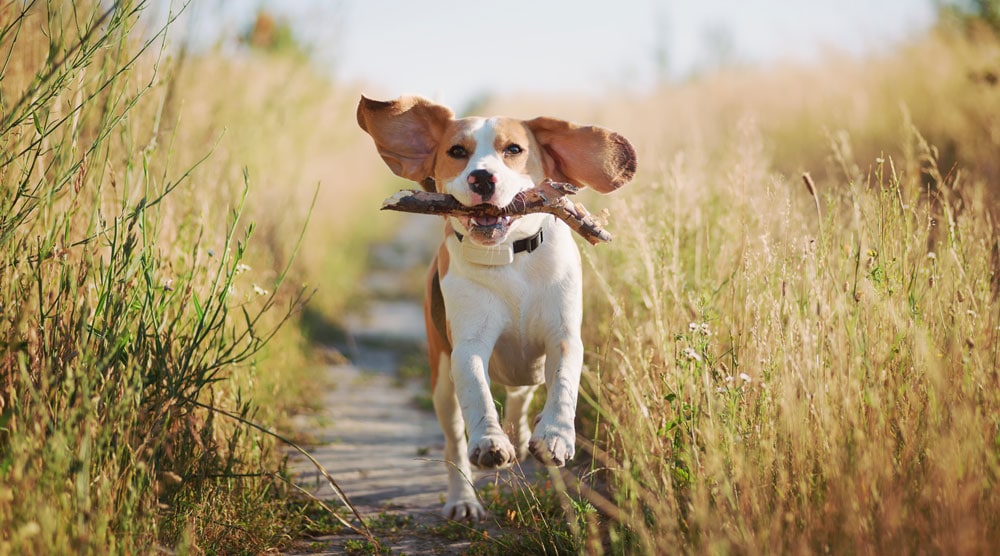
Just like humans, dogs are more likely to have a restful sleep when they’ve exercised. Exercise also reduces anxiety and stress, which are common reasons for poor sleep.
So, if your dog isn’t getting enough exercise on their daily walk, they are more likely to wake up during the night.
The amount of exercise required varies depending on breed, age, and health. You should discuss your dog’s exercise needs with your vet to ensure they’re not over or under-exercising.
Tip: You don’t need to provide all of your dog’s daily exercise in a single walk. Many people find it easier to split up exercise into 2-3 walks per day.
5. Discomfort Due to a Medical Condition
Any medical condition that causes discomfort or stress can make it more difficult for your dog to sleep. Diseases that cause your dog to urinate more frequently can also force your dog to wake up.
Some common examples include:
- Joint pain and arthritis
- Canine dementia
- Kidney disease
- Urinary tract infections
- Diabetes
Always visit a vet if your dog has started waking up at night. A vet can use scans, blood tests, and urine analysis to uncover medical issues.
Important: An accurate diagnosis is essential to provide the right treatment, so you shouldn’t try to diagnose a medical problem yourself.
6. Hunger or Thirst
A hungry or thirsty dog will find it more difficult to sleep through the night. If you’ve ever woken up with a dry throat or rumbling stomach, then you’ll understand why!
To fix this issue, you may need to adjust your dog’s dinner time, so she eats closer to bedtime. It’s also a good idea to check whether you’ve calculated your dog’s daily calorie intake correctly.
Additionally, ensure that your dog has access to water throughout the night.
7. Separation Anxiety
Separation anxiety is when a dog experiences distress due to being apart from their owner. It can be triggered at night if your dog sleeps in a different room, especially if he can’t see you.
Most dogs find being alone difficult, but severe cases of separation anxiety can cause various symptoms. These include:
- Pacing
- Panting
- Excessive salivation
- Trembling
- Barking and howling
- Toileting
- Self-harm
- Destructive behaviour
Unlike most of the other reasons on this list, separation anxiety causes distress almost immediately after the dog is left alone. However, many of these signs are silent and difficult to spot, so a dog may be suffering long before they start making noise.
A pet camera can be useful for watching how your dog behaves when he’s left alone at night. If he doesn’t settle, or shows other signs of stress, then separation anxiety could be the cause.
Separation anxiety is a difficult problem to solve. It requires gradual changes to how long your dog is left alone over an extended period of time, so you should always work with a canine behaviourist to avoid making the problem worse.
8. Nightmares
We’ve all seen our dogs wagging their tails and moving their legs during a fun dream.
But, sadly, dogs can have nightmares too. If your dog is growling, yelping, or crying in his sleep, then she may be having a night terror.
While we can’t be sure what dogs dream about, their nightmares are likely based on past events. This means nightmares are more common in rescued dogs who have experienced trauma.
You may be able to reduce the chance of nightmares by making your dog’s sleeping area more comfortable and secure. Here are some ideas you might want to try:
- Make sure your dog has a comfortable bed that she enjoys sleeping on. Some dogs like warm memory foam beds, while others prefer cooler surfaces.
- Consider making a “den” for your dog to provide extra security. A crate with a cover over the top can provide the same effect, although you’ll need to crate train your dog using positive methods.
- A calming diffuser may help to reduce anxiety and stress.
Tip: You should contact a vet if your dog has frequent nightmares. They will be able to rule out potential medical causes.

Don’t Touch a Dog Who is Having a Nightmare
It’s important not to touch a dog who is having a nightmare. You shouldn’t startle a sleeping dog at any time, but a defensive bite is even more likely during a bad dream.
The best strategy is usually to allow your dog to wake up naturally. If you feel that you need to wake your dog during a nightmare, do so by gently saying their name. Avoid startling the dog as this can make the experience even more stressful.
9. Waking Up Has Become a Positive Experience
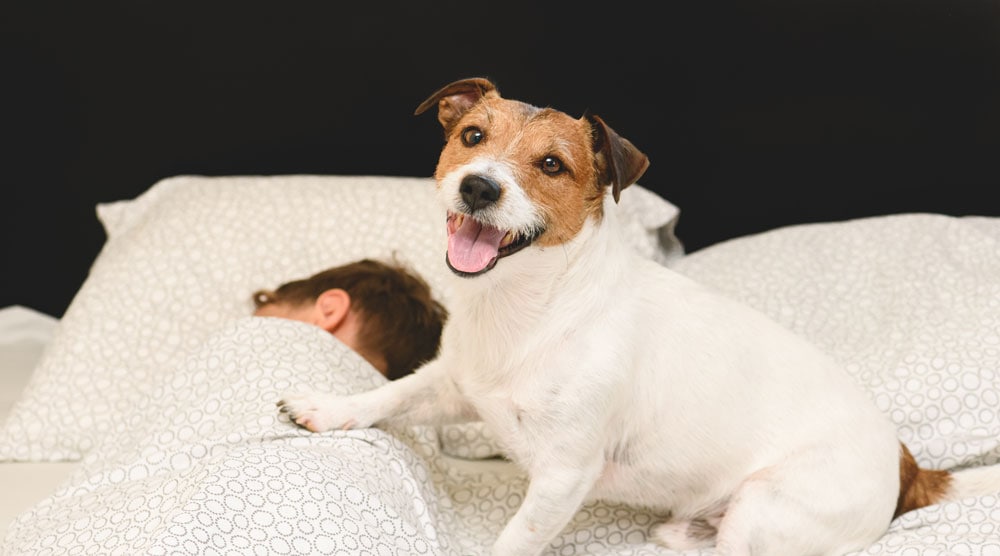
If your dog seems to wake up for no reason, then it may have become a habit.
It’s easy to reinforce an unwanted behaviour accidentally. So, think about what usually happens when your dog wakes up, and whether it might have become a positive experience.
For example, does your dog often get attention when he wakes up at night? Do you give him a chew or toy to help him settle? Or do you allow him to come and sleep in the bedroom when he disturbs you?
While it’s normal to want to comfort your dog when he wakes up at night, making the experience too fun could increase the chances of it happening again.
This only applies when there’s not an underlying issue though. If your dog is overheating, suffering from illness, needs the toilet, or is anxious, then you shouldn’t ignore him.
10. Discomfort Due to Bedding
An uncomfortable bed can make it much more likely that your pet wakes up throughout the night.
Here are some things to consider when choosing a dog bed:
- A common issue with dog beds is a lack of support. If your dog sinks through the foam padding to the floor, then this could be putting uncomfortable pressure on the joints.
- Many owners buy beds that are too small. Your dog should be able to comfortably lay in any position on a bed without hanging off the edge.
- Dogs have different preferences. Some like to snuggle up against a bolster, while others like to stretch out. Take note of your dog’s sleeping position and try to choose a bed that matches their natural preferences.
Soft and supportive bedding is particularly important for senior dogs who have joint pain. Aching joints are a common reason for a dog to wake up, so consider buying a memory foam bed that can support the hips, knees, and shoulders without causing uncomfortable pressure.
11. A Change in Routine
Dogs thrive when they have a consistent routine. If your dog’s routine has recently changed, or is regularly disrupted, then this could be why he’s finding it difficult to sleep through the night.
While you don’t need to make every day exactly the same, you should try to walk, feed, toilet, and play with your pet at roughly the same time. Bedtime should also be as consistent as possible.
12. Too Hot or Cold
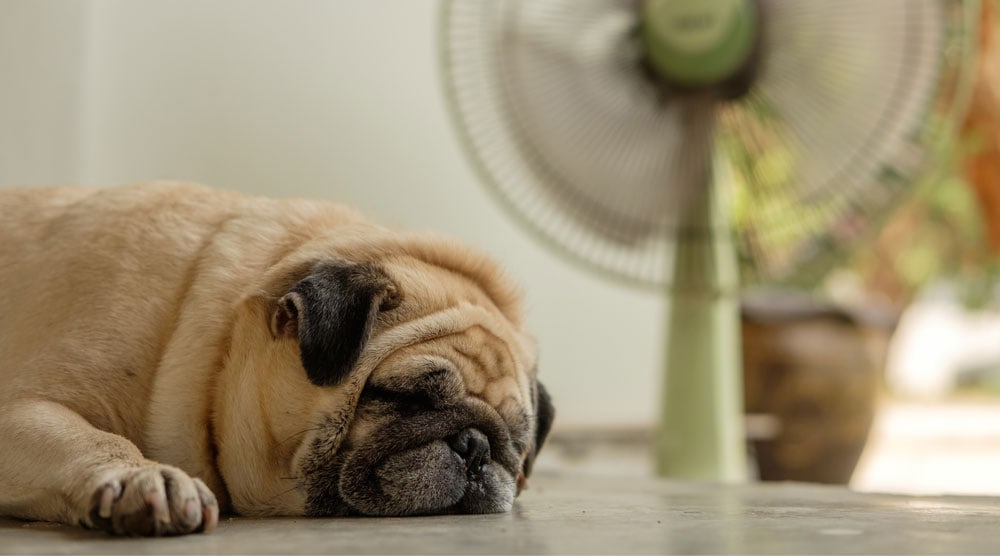
It’s important to ensure your dog is a comfortable temperature at night. If they are too hot or cold, then it’ll be difficult for them to get a restful sleep.
Dogs find it more difficult to regulate their body temperature than humans. They can’t sweat from the majority of their body, for example, so they must rely on panting to keep cool.
Remember, dogs can’t change their environment if they are hot or cold. Unlike humans, who can switch on a fan or turn on the heating, a dog is helpless when they are an uncomfortable temperature. This can lead to stress, frustration and poor sleep quality.
13. Sleep Apnea
Many people don’t realise dogs can suffer from sleep apnea. Like with humans, sleep apnea can disturb a dog’s sleep and make it more likely for them to wake up.
Sleep apnea is when breathing temporarily stops during sleep. This causes the dog’s body to jolt to start breathing again.
As you can imagine, the constant cycle of a lack of oxygen followed by a sudden jump can lead to severe sleep deprivation. Over time, the lack of high-quality sleep can cause a variety of health risks.
Canine sleep apnea usually develops gradually. It often starts with louder snoring, before progressing to choking or jolting during sleep. The dog may also become more irritable when awake.
While any dog can develop sleep apnea, it’s most common in obese dogs, those with allergies, or brachycephalic breeds (those with flattened faces). You should always contact your vet if you think your dog might have sleep apnea, as potential treatments depend on the underlying cause.
14. Overstimulation Before Bed
It might seem like a good idea to tire your dog out before bed, but high-intensity activities could worsen sleep problems.
Dogs become aroused during play or exercise. Heart rate, breathing speed, and blood pressure are all increased to cope with physical activity. Stress hormones may also be released if the dog is highly aroused.
These physiological changes don’t go away immediately – they can last many hours after the activity stops. This can make it difficult for a dog to relax and sleep.
To prevent this issue, avoid exciting play sessions or high-intensity exercise for at least a few hours before bed.
It’s also a common mistake to think that an easily excited dog needs more exercise to tire it out.
Over-arousal can have the opposite effect, leading to more excitement and difficulty in calming down. While exercise is essential, if your dog always seems to be over-excited or impossible to tire out, you should contact a qualified behaviourist.
Note: Many owners mistake an excited dog with a happy one. A dog who is frantically running with its tongue out, a big grin on its face, and who is unable to settle is probably stressed rather than happy.
15. Canine Cognitive Dysfunction Syndrome in Senior Dogs
Canine cognitive dysfunction (CCD) syndrome, also known as dog dementia, is a potential cause of poor sleep in senior dogs.
CCD usually starts with mild symptoms, including restlessness or anxiety. As the condition progresses, it can cause more severe issues, such as excessive barking, incontinence, loss of appetite, and irritability.
One of the most common signs of CCD is a change in the dog’s sleep cycle. Many dogs with this condition start to sleep more during the day and wake at night, making this a warning sign that your dog may need veterinary care.
Unfortunately, there’s no cure for CCD. Some treatments and therapies can dramatically slow down its progression, however, so you should always visit a vet if you suspect your dog has CCD.
How to Stop a Dog from Waking Up at Night
There are many ways to encourage your dog to sleep at night, but the right strategy depends on the underlying cause.
With that said, here are some general steps to improving your dog’s sleep:
- Check for medical or dietary problems. A vet should assess any behaviour change in your dog. Urinary tract infections, diabetes, canine dementia, and various other illnesses can all cause sleep problems, and these conditions won’t improve without the right treatment.
- Assess and improve your dog’s routine. Does your dog often get over-excited before bed? Does she get the chance to go to the toilet right before bedtime? Is your dog getting hungry at night? And do you provide enough physical and mental stimulation throughout the day? All of these factors can affect whether your dog can sleep through the night.
- Improve your dog’s sleeping environment. Once you’ve ruled out medical, dietary, and routine factors, the next step is to make your dog as comfortable as possible. All dogs should have a supportive bed – memory foam beds are a great option – and consider playing white noise to cover up disruptive sounds. Ensure that your dog isn’t too hot or cold at night, provide water at all times, and consider darkening the room. Dogs often enjoy security, so you may want to provide a covered sleeping area or a crate, although crates need to be introduced slowly, so they aren’t an instant fix.
- Have patience! Remember, your dog is not trying to be dominant or naughty when he wakes you up. There is always an underlying reason, but it may take time to work out what’s causing him to wake up and to find a solution.
Related Article: Why Does My Elderly Dog Sleep All Day?
Should Your Dog Sleep in Your Bed?
This is a common question – and there’s no right or wrong answer.
There’s a misconception that sleeping with a dog will cause separation anxiety. There isn’t any evidence that this is the case, however, so you shouldn’t worry about causing behavioural problems by allowing your dog to sleep with you.
Sleeping with your dog isn’t a good idea if you suffer from allergies though. The constant movement of a dog can also prevent you from getting high-quality sleep, which is something to keep in mind if you’re often tired.
Even so, having a dog in the bed provides warmth, security, and companionship. Many people find that these benefits outweigh the downsides.
Frequently Asked Questions
Why Does My Dog Wake Up When I Move?
There are four stages of sleep. During the first and second stages, a dog is napping rather than in a deep sleep.
Dogs spend more time in these lighter sleep stages than humans, so they are more likely to wake up in response to small noises or movements. This is possibly a relic of their wolf ancestry, as being alert to a threat – even during sleep – is essential in the wild.
Many dogs also want to know where their owners are at all times. If they hear you move around, they’ll instantly be alert to see if you’re leaving the room.
Why Does My Senior Dog Wake Up in the Night?
As dogs get older, they may suffer from conditions affecting their sleep quality.
Arthritis is one of the most common examples. Aching joints can make it difficult to sleep comfortably, although a soft memory foam bed can help.
Canine dementia is also frequently seen in senior dogs. It can cause sleep disturbances and changes to sleep patterns, leading to the dog waking up throughout the night.
Summary
It can be frustrating if your dog wakes up during the night. You should never punish your dog for waking up though, as there’s always an underlying reason.
A vet should assess any behaviour change. Once illness has been ruled out, some of the most frequent causes of waking up include needing the toilet, hunger, overstimulation, or a lack of exercise during the day.
We hope this article has helped you uncover why your dog might be waking up in the middle of the night. If you have any questions, please let us know in the comments section below.
